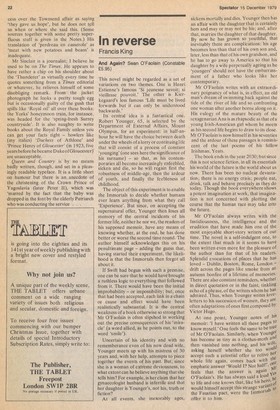In reverse
Francis King
And Again? Sean O'Faolain (Constable £5.95) This novel might be regarded as a set of variations on two themes. One is Henri Estienne's famous `Si jeunesse savoit; si vieillesse pouvoit.' The other is Kierkegaard's less famous 'Life must be lived forwards but it can only be understood backwards.'
Its central idea is a fantastical one. Robert Younger, 65, is selected by the Department of External Affairs, Mount Olympus, for an experiment: in half-anhour he will have the choice between death under the wheels of a lorry or continuing life that will consist of a process of constant 'younging' (one sees here the significance of his surname) — so that, as his contemporaries all become increasingly enfeebled, sicken and die, so he will regain first the robustness of middle-age, then the ardour of youth, and finally the feebleness of childhood.
The object of this experiment is to enable the Immortals to decide whether humans ever learn anything from what they call 'Experience'. But since, on accepting the supernatural offer, Younger then loses all memory of the central incidents of his former life, neither he nor we, the readers of his supposed memoir, have any means of knowing whether, at the end, he has done better or worse the second time round. The author himself acknowledges this on his penultimate page — adding the guess that, having started their experiment, the likelihood is that the Immortals then forgot all about it.
If Swift had begun with such a premise, one can be sure that he would have brought a ruthless logic to everything that followed from it. There would have been the initial improbability — or impossibility; but, once that had been accepted, each link in a chain or cause and effect would have been realistically substantial. It is the central weakness of a book otherwise so strong that Mr O'Faolain is often slipshod in working out the precise consequences of his 'miracle' (a word allied, as he points out, to the word `smile').
Uncertain of his identity and with no rememberance even of his now dead wife, Younger meets up with his mistress of 30 years and, with her help, attempts to piece together the events of his past. But, since she is a woman of extreme deviousness, to what extent can he believe anything that she tells him? For example, is her claim that her gynaecologist husband is infertile and that her daughter is Younger's, not his, truth or fiction?
At all events, she inexorably ages, sickens mortally and dies. Younger then has an affair with the daughter that is certainly hers and may or may not be his; and, after that, marries the daughter of that daughter. By now he has _grown so .youthful, that inevitably there are complications: his age becomes less than that of his own son and, later, less than that of his own grandson, and he has to go away to America so that his daughter by a wife perpetually ageing as he 'youngers' should not have the embarrassment of a father who looks like her contemporary.
Mr O'Faolain writes with an extraordinary poignancy of what is, in effect, an old man's dream of swimming back against the tide of the river of life and so confronting one woman after another borne along on it. His eulogy of the mature beauty of the sexagenarian Ana is as rhapsodic as that of a young Irish-American girl whom he meets as his second life begins to draw to its close. Mr O'Faolain is now himself in his seventies and the ardour of these passages is reminiscent of the last poems of his fellow Irishman, Yeats.
The book ends in the year 2030; but since this is not science fiction, in all its essentials his world of the future is the world about us now. There has been no nuclear devastation; there is no energy crisis; people eat, drink, talk and behave precisely as they do today. Though the book everywhere shows a potent imagination at work, that imagination is not concerned with plotting the course that the human race may take into the future, Mr O'Faolain always writes with the fastidiousness, the intelligence and the erudition that have made him one of the most enjoyable short-story writers of our time. The novel is a self-indulgent one, to the extent that much in it seems to have been written even more for the pleasure of the author than for that of his readers. Splendid evocations of places that he has loved — Dublin, Boston, Rome, London — drift across the pages like smoke from au autumn bonfire of a lifetime of memories. There are also constant reminders, whether in direct quotation or in the faint, tinkling echo of a phrase, of the writers whom he has admired. Thus, when Younger writes love letters to his succession of women, they are often adaptations of ones first composed IV Victor Hugo. At one point, Younger notes of his memoir: 'I have written all these pages to know myself.' One feels the same to be true of Mr O'Faolain. Similarly, when Younger, has become as tiny as a clothes-moth an° then vanished into nothing, and his wife asking herself whether she too wowr accept such a celestial offer to relive he whole life again, comes back with rn_ee emphatic answer 'Would I? Not hale, 011‘14r feels that the answer is, again O'Faolain's. He has always said a loud to life and one knows that, like his hero, would himself accept this strange the Faustian pact, were the Immortals offer it to him. vadat". i,"c;


































 Previous page
Previous page